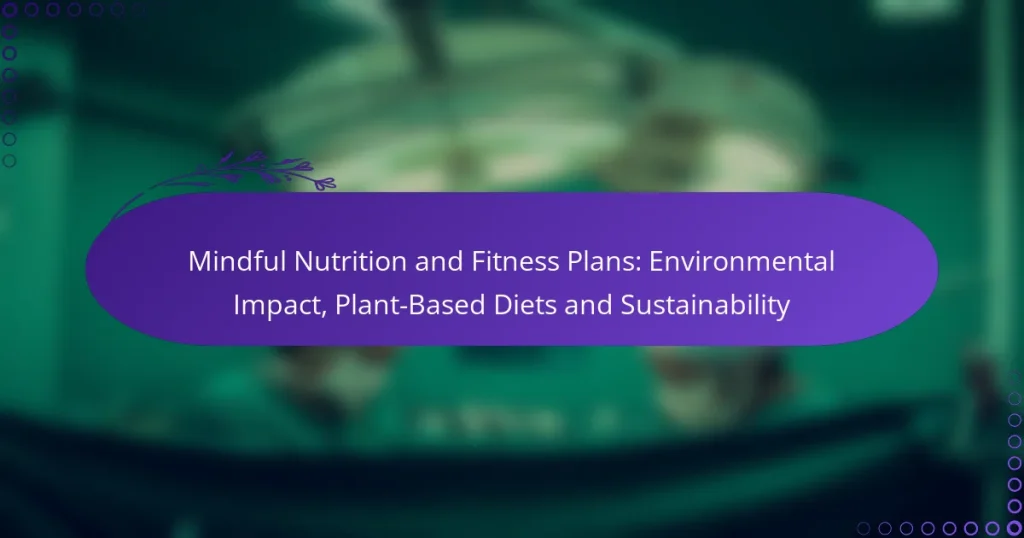Mindful nutrition and fitness plans are essential for fostering healthier lifestyles, particularly in urban environments. By emphasizing awareness of food choices and their impact on health, individuals can make sustainable nutrition decisions that not only benefit their well-being but also the planet. Tailoring fitness plans to personal goals further enhances motivation and effectiveness, leading to lasting positive changes.
Mindful Nutrition and Fitness Plans: Local Ingredients, Organic Choices and Nutrition Decisions
Mindful Nutrition and Fitness Plans: Environmental Impact, Plant-Based Diets and Sustainability
Mindful Nutrition and Fitness Plans: Budget-Friendly Options, Sustainable Eating and Family Health
Mindful Nutrition and Fitness Plans: Sustainable Ingredients, Meal Planning and Health Benefits
Mindful Nutrition and Fitness Plans: Mediterranean Diet, Paleo Diet and Sustainability Comparison
Mindful Nutrition and Fitness Plans: Seasonal Foods, Nutrition Benefits and Sustainability
How can mindful nutrition improve fitness in urban areas?
Mindful nutrition can significantly enhance fitness in urban areas by promoting healthier eating habits and better food choices. By focusing on awareness of food intake and its effects on the body, individuals can improve their overall health and fitness levels.
Balanced meal planning
Balanced meal planning involves creating meals that include a variety of food groups, ensuring adequate intake of proteins, carbohydrates, and fats. Aim for meals that incorporate lean proteins, whole grains, and plenty of fruits and vegetables. A simple approach is to fill half your plate with vegetables, a quarter with protein, and a quarter with whole grains.
Consider preparing meals in advance to avoid unhealthy last-minute choices. This can be particularly useful in urban settings where time is often limited. Batch cooking on weekends can help maintain a balanced diet throughout the week.
Incorporating local produce
Incorporating local produce into your diet not only supports local farmers but also ensures fresher and more nutritious options. Urban areas often have farmers’ markets where seasonal fruits and vegetables can be purchased. These items are typically picked at peak ripeness, enhancing flavor and nutrient content.
When shopping, prioritize seasonal produce to reduce costs and environmental impact. For example, in summer, focus on tomatoes, cucumbers, and berries, while in winter, opt for root vegetables and hearty greens.
Mindful eating practices
Mindful eating practices encourage individuals to pay attention to their hunger cues and the sensory experience of eating. This can involve slowing down during meals, savoring each bite, and eliminating distractions like screens. By doing so, you can better recognize when you are satisfied, potentially reducing overeating.
Consider setting aside specific times for meals without multitasking. This can help create a more enjoyable eating experience and foster a healthier relationship with food.
Hydration strategies
Staying hydrated is crucial for optimal fitness and overall health, especially in urban environments where heat and activity levels can vary. Aim to drink at least 2 liters of water daily, adjusting based on your activity level and climate. Carrying a reusable water bottle can help remind you to hydrate throughout the day.
Incorporate hydrating foods like cucumbers, oranges, and watermelon into your meals. These can contribute to your daily fluid intake while providing essential nutrients.
Community fitness programs
Community fitness programs offer an excellent way to stay active while fostering social connections. Many urban areas provide free or low-cost classes in parks, gyms, or community centers, ranging from yoga to group runs. Participating in these programs can enhance motivation and accountability.
Look for local initiatives that promote outdoor activities or fitness challenges. Joining a group can make exercising more enjoyable and provide a support network for achieving fitness goals.
What are the best sustainable nutrition choices?
The best sustainable nutrition choices focus on minimizing environmental impact while promoting health. Key options include plant-based diets, seasonal eating, and organic food options, each offering unique benefits and considerations.
Plant-based diets
Plant-based diets emphasize foods derived from plants, including fruits, vegetables, grains, nuts, and seeds. These diets can reduce carbon footprints significantly, as they typically require fewer resources than animal-based diets.
When adopting a plant-based diet, consider incorporating a variety of protein sources such as legumes, tofu, and quinoa to ensure adequate nutrient intake. Aim for a balance of whole foods and limit processed items to maximize health benefits.
Seasonal eating
Seasonal eating involves consuming foods that are in season in your region, which can enhance freshness and flavor while reducing transportation emissions. This practice encourages a diverse diet that aligns with local agricultural cycles.
To practice seasonal eating, visit local farmers’ markets or join a community-supported agriculture (CSA) program. Check seasonal produce guides for your area to plan meals around what’s available, ensuring variety and nutrition throughout the year.
Organic food options
Organic food options are produced without synthetic fertilizers, pesticides, or genetically modified organisms (GMOs), promoting environmental health and biodiversity. Choosing organic can reduce exposure to harmful chemicals and support sustainable farming practices.
When selecting organic products, look for certification labels to ensure authenticity. While organic foods can be more expensive, consider prioritizing organic purchases for the “Dirty Dozen,” a list of produce items with higher pesticide residues, to maximize health benefits.
How to create a personalized fitness plan?
Creating a personalized fitness plan involves assessing your current fitness level, defining specific goals, and selecting exercises that align with those objectives. Tailoring your plan ensures that it meets your unique needs and keeps you motivated.
Assessing fitness goals
Start by identifying what you want to achieve with your fitness plan. Common goals include weight loss, muscle gain, improved endurance, or overall health enhancement. Be specific about your objectives, such as losing 5-10 kg or running a 5K in under 30 minutes.
Consider using the SMART criteria: goals should be Specific, Measurable, Achievable, Relevant, and Time-bound. This framework helps clarify your intentions and provides a roadmap for your progress.
Choosing appropriate exercises
Select exercises that align with your fitness goals and current abilities. For weight loss, incorporate a mix of cardio and strength training, while endurance goals might focus more on aerobic activities like running or cycling. Aim for a balanced routine that includes flexibility and mobility work.
Consider your preferences and lifestyle when choosing exercises. Activities you enjoy are more likely to be sustainable. For example, if you dislike running, opt for swimming or group fitness classes instead.
Setting achievable milestones
Break your main goal into smaller, manageable milestones to track your progress. For instance, if your goal is to run a 5K, set milestones like running 1 km without stopping, then 2 km, and so on. This approach fosters motivation and allows for adjustments if needed.
Regularly review your milestones and celebrate achievements, no matter how small. This practice keeps you engaged and committed to your fitness journey. Aim to reassess your plan every few weeks to ensure it remains aligned with your evolving goals and fitness level.
What role does meal prep play in mindful nutrition?
Meal prep is essential for mindful nutrition as it allows individuals to plan and prepare their meals in advance, promoting healthier eating habits. By organizing meals, one can ensure balanced nutrition, save time, and reduce stress related to food choices throughout the week.
Time management benefits
Meal prep significantly enhances time management by streamlining the cooking process. Preparing meals in batches can cut down daily cooking time to just a few minutes, freeing up hours during the week for other activities.
For instance, dedicating a few hours on the weekend to cook and portion meals can lead to quick, healthy options ready to go during busy weekdays. This approach minimizes the temptation to opt for unhealthy fast food or takeout due to time constraints.
Reducing food waste
Effective meal prep helps in reducing food waste by allowing individuals to plan their grocery lists based on specific meals. By purchasing only what is needed for the week, one can avoid overbuying and ensure that ingredients are used before they spoil.
For example, if you plan to use fresh vegetables in multiple meals, you can buy them in quantities that match your meal prep schedule, thus minimizing leftovers that may go unused. This not only saves money but also contributes to more sustainable eating practices.
Enhancing nutritional quality
Meal prep enhances nutritional quality by allowing individuals to select wholesome ingredients and control portion sizes. By preparing meals at home, you can incorporate a variety of fruits, vegetables, whole grains, and lean proteins into your diet.
Additionally, having pre-prepared meals can help avoid the pitfalls of unhealthy snacking or impulsive eating. For instance, having a balanced meal ready to eat can keep you from reaching for processed snacks, ultimately improving overall dietary quality.
How to evaluate nutrition and fitness programs?
To evaluate nutrition and fitness programs, consider their alignment with your personal health goals, the scientific basis of their recommendations, and their sustainability over time. Look for programs that offer a balanced approach, incorporating both nutrition and physical activity tailored to your lifestyle.
Criteria for selection
When selecting a nutrition and fitness program, prioritize evidence-based practices that are backed by scientific research. Check if the program is designed by qualified professionals, such as registered dietitians or certified fitness trainers, to ensure credibility and safety.
Consider the program’s flexibility and adaptability to your individual needs. A good program should allow for modifications based on dietary preferences, fitness levels, and any medical conditions. This ensures that you can maintain the program long-term without feeling restricted.
Lastly, evaluate the program’s support system. Look for options that provide access to community support, coaching, or resources that can help you stay motivated. Programs with a strong support network can significantly enhance your chances of success.






